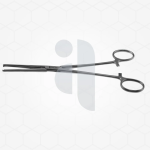Intestinal clamps are essential surgical instruments designed to assist healthcare professionals during complex medical procedures. These specialized tools are critical for managing and controlling sections of the intestine, ensuring precision and safety throughout the surgery. Alongside related instruments like Intestinal clamps and hemostat clamps, they play an irreplaceable role in modern operating rooms.

Constructed from high-grade stainless steel, intestinal clamps are durable and easy to sterilize, making them a reliable choice for multiple uses. Their design typically includes adjustable tension mechanisms to ensure effective yet safe clamping.
Surgeons often use intestinal clamps alongside other instruments like hemostat clamps. Hemostat clamps assist in controlling bleeding by gripping blood vessels, while the Barbara needle is commonly used for suturing during intestinal repairs. Together, these tools create a streamlined process for executing intricate surgical procedures.
Whether you're a medical professional or an organization looking to equip your facility, understanding the significance of intestinal clamps and related instruments helps in making informed decisions for better surgical outcomes.

What Are Intestinal Clamps?
Intestinal clamps are surgical tools used primarily in gastrointestinal and abdominal surgeries. Their main purpose is to temporarily close or hold sections of the intestine without causing damage to the delicate tissue. These clamps are crafted with precision to create minimal impact while providing maximum control, allowing surgeons to perform accurate incisions or repairs.Constructed from high-grade stainless steel, intestinal clamps are durable and easy to sterilize, making them a reliable choice for multiple uses. Their design typically includes adjustable tension mechanisms to ensure effective yet safe clamping.
Key Features of Intestinal Clamps
- Tissue-Safe Design
The surface of intestinal clamps is smooth to prevent unnecessary trauma to the intestinal walls. This feature is particularly important when working on delicate organs. - Ergonomic Build
These clamps are designed to provide comfort and ease of handling for surgeons, allowing for prolonged use without fatigue. - Precision and Control
Intestinal clamps ensure an even distribution of pressure, helping surgeons maintain control and accuracy throughout the procedure. - Versatility
They are compatible with an array of other surgical instruments, such as the Barbara needle and hemostat clamps, which are often used in tandem to enhance surgical outcomes.
Uses of Intestinal Clamps in Surgeries
Intestinal clamps are primarily utilized during procedures such as bowel resections, colostomies, and intestinal repairs. Their ability to temporarily close off segments of the intestine aids in minimizing blood loss and maintaining clear visibility within the surgical field. These clamps also play a crucial role in controlling the flow of intestinal contents, which is vital for creating a sterile environment and preventing contamination.Surgeons often use intestinal clamps alongside other instruments like hemostat clamps. Hemostat clamps assist in controlling bleeding by gripping blood vessels, while the Barbara needle is commonly used for suturing during intestinal repairs. Together, these tools create a streamlined process for executing intricate surgical procedures.
Why Choose High-Quality Intestinal Clamps?
The quality of surgical instruments directly impacts the success of any procedure. High-quality intestinal clamps ensure reliability and patient safety. Their robust construction not only guarantees precise performance but also supports long-term use. For hospitals and surgical centers, investing in premium tools like intestinal clamps, Barbara needles, and hemostat clamps is an investment in delivering the best care possible.Final Thoughts
Intestinal clamps are indispensable in the realm of surgical instruments, offering precision, safety, and efficiency during abdominal operations. Paired with complementary tools like the Barbara needle and hemostat clamps, they empower surgeons to achieve exceptional results while prioritizing patient well-being. By using high-grade instruments, healthcare professionals can ensure safer surgeries and faster recoveries for their patients.Whether you're a medical professional or an organization looking to equip your facility, understanding the significance of intestinal clamps and related instruments helps in making informed decisions for better surgical outcomes.
